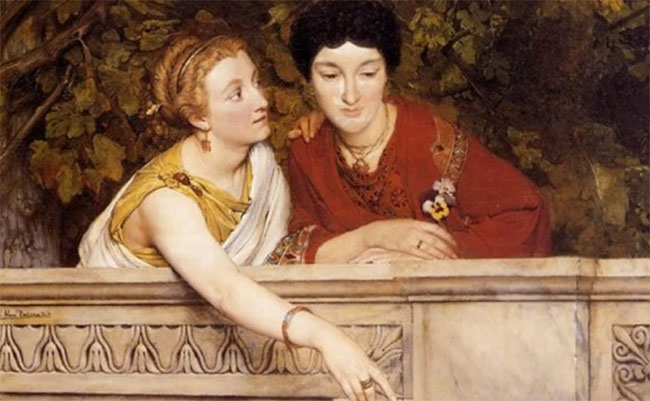What role did women play in ancient Rome?
The value of ancient Roman women depended on their fathers and husbands.
Women in ancient Rome, whether free citizens or slaves, played many different roles : queen, priestess, shopkeeper, midwife, wife or mother. And they are similar in that they do not have any voice in society.
The value of Roman women of this period was determined almost exclusively in relation to their father and husband . None of the Roman women were allowed to vote, play a direct role in political or military affairs. They also do not take on the main role in the state apparatus.
However, there are still glimmers of light fighting for women's rights. They are men of education and status, always seeking to claim their rights by influencing the men in their lives.

Women in ancient Rome played many different roles.
What did ancient Roman men write about women?
One scholar wrote of his 15-year-old bride, who was 25 years younger than him after they got married: "She is very intelligent and a well-rounded housewife. Her dedication has proven itself." My wife is a wonderful person."
Some records of ancient Roman women show that their daily work was weaving, doing housework, cooking and taking care of the family. Women do not have the right to name themselves and they must always show modesty. Any person who goes beyond the set rules will have to pay the price.
"Open Door" Religion
While ancient Roman society was dominated by men, the Roman gods were not. Of the three supreme gods worshiped by the ancient Romans, only one Jupiter was male. The other two are goddesses Juno and Minerva, daughter of Jupiter, goddess of wisdom and war.
Prior to the 4th century, the Romans followed the cult of the Goddess Vesta . She is one of the three main Roman virgin goddesses, the other two being Minerva and Diana. The fireplace is an extremely sacred symbol for this goddess. Therefore, maintaining the fire in the furnace located at the temple was the most important task.
It is said that this fire represents the destiny as well as the prosperity of the nation. If it suddenly goes out, it is an omen that disaster is about to come. Therefore, in the temple of Vesta there must always be someone on duty.
The Vestal virgins are the ones who are responsible for maintaining and protecting that fire. They often appoint 6 people to eat and sleep in the temple, constantly watching, keeping the fire burning evenly throughout the year.

Before the 4th century, the Romans followed the belief of the goddess Vesta.
In the ancient Roman state, religion was associated with politics. The Vestal virgins are therefore treated with boundless reverence. No one, not even the king, was allowed to insult a Vestal virgin. If any man dares to deceive and seduce the Vestals to lose their virginity, they will suffer the most terrible punishment: being beaten to death with a whip.
Roman women exerted a certain influence
Limited interests did not prevent some educated ancient Roman women, all from the upper classes, from exerting influence through their powerful men.
Among them, the most prominent example is Cornelia , daughter of the famous Roman general Publius Cornelius Scipio Africanus. Having received a formal education and raised in a family with a military leader father, Cornelia is known as a smart, sharp girl.
After her husband died early, she became a young widow, refused to marry again to raise 3 children alone. As her two sons followed the path of reform, the woman spoke out in support of her children. Although her two children were later assassinated, Cornelia was still respected by the people because of her profound knowledge.
Faustina was the daughter of the emperor Antoninus Pius who was married to the future king Marcus Aurelius and had 14 children. One of her children later inherited the throne.

Limited interests did not prevent some ancient Roman women from being educated.
She is the rare woman to be awarded the Augusta, the highest honor a woman can receive. Faustina was revered by the military as she frequently accompanied her husband on various campaigns.
As the centuries passed, women in ancient Rome increasingly moved beyond the overwhelming shadow of men. Although we do not know all of their names, stories related to them appear in the relics left by the family.
- Ancient dogs play a role in bringing the deceased to the afterlife
- 6 interesting facts about ancient women that women themselves are surprised
- Find out the solution to the mystery of orgasm in women
- Temple in Arles
- The 3,000-year-old statue in Turkey reflects feminism
- Were women allowed to fight as gladiators in ancient Rome?
- Discovered the sarcophagus from ancient Rome
- The role of women in science is increasing
- Zinc may play a key role in eye disease
- Journey to find her husband over hundreds of kilometers of ancient European women
- Recreate Rome in 1 day
- Exam written about women in science
 Biography of hero Vu A Dinh
Biography of hero Vu A Dinh History of hematology
History of hematology Who is Mr. Tam Da 'Phuc-Loc-Tho' and what does it mean?
Who is Mr. Tam Da 'Phuc-Loc-Tho' and what does it mean? Unbelievable facts about the history of the oil and gas industry: Gasoline used to be cheaper than water, so abundant that it had to be dumped into the river...
Unbelievable facts about the history of the oil and gas industry: Gasoline used to be cheaper than water, so abundant that it had to be dumped into the river...